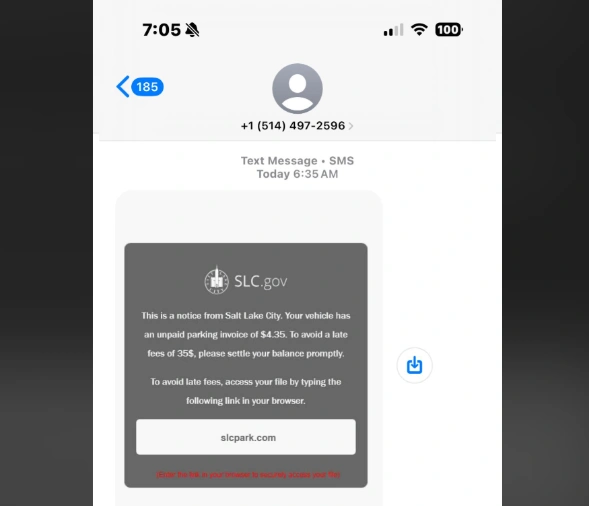Online scams are growing every day, and the SLCPark.com unpaid parking invoice text scam is the latest trick fooling people. This scam uses fear and urgency to steal personal and financial details from unsuspecting individuals.
Let’s simplify what’s happening and how to protect yourself.
What is the SLCPark.com Unpaid Parking Invoice Text?
This scam starts with a text message pretending to be from Salt Lake City parking authorities.
It claims you have an unpaid parking fine and threatens extra fees—usually $35 or more—if you don’t pay immediately.
The text includes a link to a fake website, slcpark.com, which looks very real at first glance.
The scam website copies the official Salt Lake City parking portal’s design to trick people.
It asks for sensitive information, like credit card details, to “pay” the fine.
But instead of resolving any real issue, victims unknowingly give away their data to scammers.
These scammers have mastered their tricks. By copying the official site’s look and language, they make the scam feel legitimate.
Sadly, anyone who uses the fake site risks losing money, getting their identity stolen, or being targeted for further fraud.
What’s even scarier is how far this scam spreads. Many people, even those without cars or who don’t live in Salt Lake City, have received these texts.
This shows the scammers are sending these messages to random people without any proper checks.
Remember, the official Salt Lake City parking website is slc.gov. If you see a different link, like slcpark.com, be suspicious.
Salt Lake City parking authorities have warned people about this scam and urge them to verify any parking-related claims directly on slc.gov.
Avoid clicking links in messages.

Our Opinion
This scam shows how important it is to be careful with unexpected texts. Scammers use panic and urgency, like threats of late fees, to pressure people into acting without thinking.
Legitimate organizations, especially government agencies, don’t use scary or threatening language.
They keep their messages clear and professional and always let you verify information on their official channels.
Look out for signs of a scam, such as bad grammar, spelling mistakes, or awkward wording in the message.
Scammers often keep their texts vague. Real parking notices, for example, will include specific details like your car’s license plate or a ticket number.
Victims of the SLCPark.com scam don’t just lose money—they also risk identity theft. The personal information entered on the fake site can be sold or misused.
Scammers are constantly finding new ways to trick people, so staying alert and informed is the best way to protect yourself.
Scams like these show how important it is to stay skeptical online.
Always double-check any suspicious messages, and if in doubt, contact the organization through their official website or number.
Being cautious is the best way to avoid getting scammed.
What to Do If You Get Scammed
If you’ve already fallen for this scam, act quickly to protect yourself. Call your bank or credit card company to report the fraud and freeze your account if needed.
Request a new card to prevent more charges.
Keep an eye on your accounts for any strange activity. Scammers often make more attempts after their first success.
Also, update the passwords on your online accounts, especially those tied to your financial information.
Report the scam to the Federal Trade Commission (FTC) or your local police. They can guide you on what to do next and may investigate the scam.
You should also inform Salt Lake City parking authorities so they can track the spread of the scam.
Teluvor.com claims to be a cryptocurrency trading and investment site. It promises exciting perks like free Bitcoin, high returns, and advanced tools for managing your portfolio.


